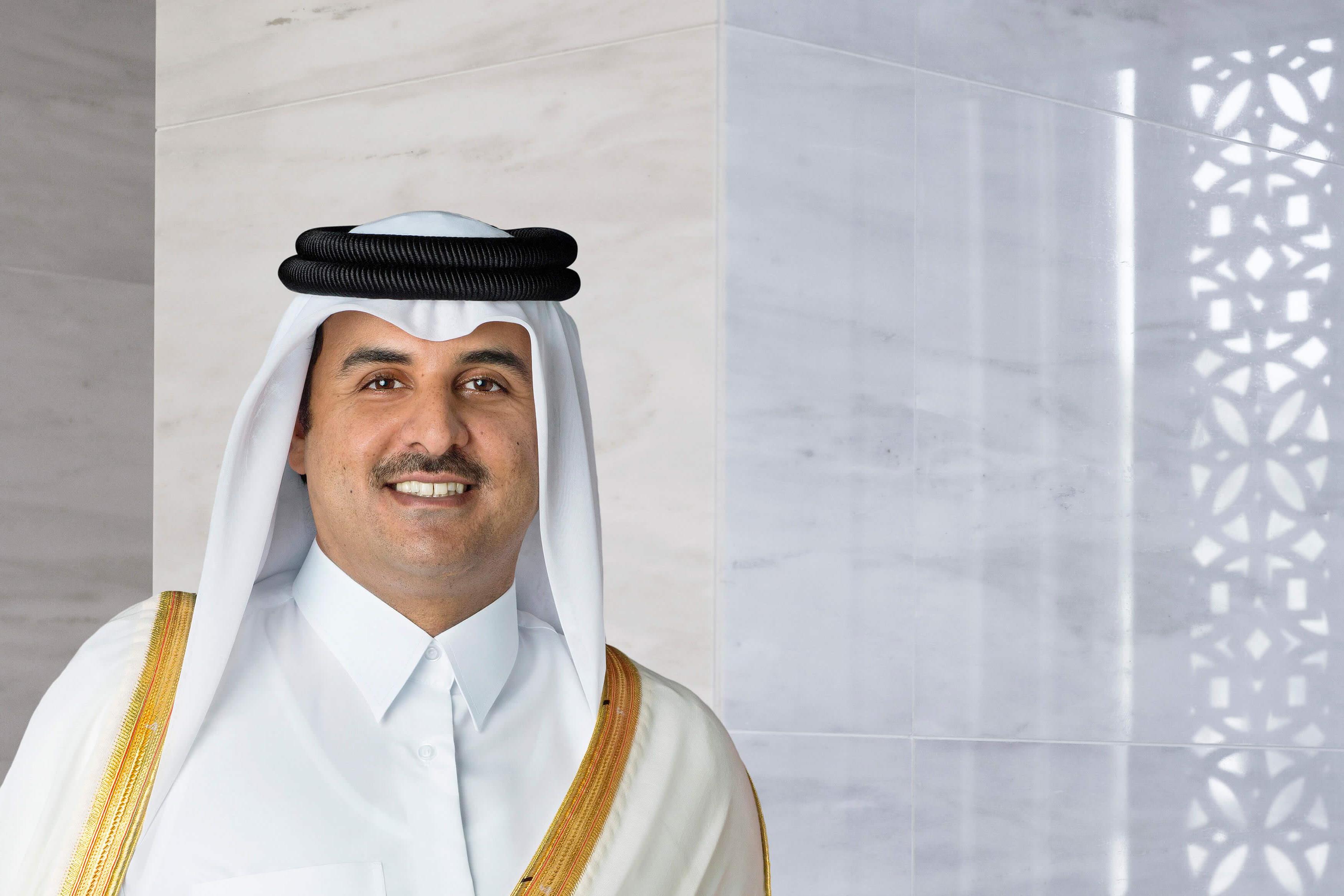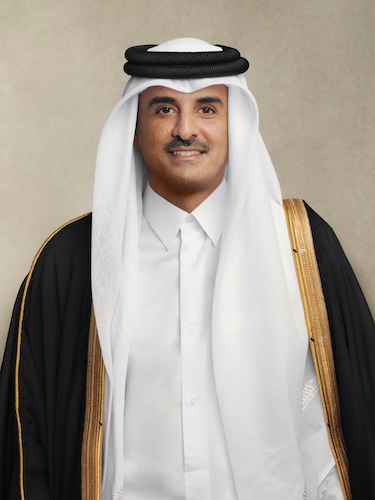His Highness Sheikh Tamim bin Hamad Al Thani
Amir of the State of Qatar


His Highness Sheikh Tamim bin Hamad Al Thani assumed his duties as Amir of the State of Qatar on 25th June 2013, following the announcement of His Highness The Father Amir, Sheikh Hamad bin Khalifa Al Thani, in an address to the Qatari people, of his decision to hand over power to his Heir Apparent and the pledge of allegiance to HH Sheikh Tamim by the Qatari people as the new Amir.
Birth and Study
HH Sheikh Tamim bin Hamad Al Thani was born on June 3rd, 1980 in Doha, Qatar, where he received his primary and secondary schooling. He then joined Sherborne School in the United Kingdom, where he continued his secondary schooling and graduated in 1997.
His Highness then pursued his higher education in the United Kingdom, where he attended the Royal Military Academy of Sandhurst, graduating in 1998.
After graduating from Sandhurst, His Highness joined Qatar’s Armed Forces, combining both military academic study and practical and on the field experience.
As Heir Apparent
On August 5, 2003, His Highness was appointed Heir Apparent and Deputy Commander-in-Chief of the Armed Forces. During his tenure, he chaired a number of bodies and supreme councils in different fields, such as the Supreme Education Council, the Supreme Council of Health, the Supreme Council for the Environment and Natural Reserves, the Supreme Council for Information and Communication Technology, Board of Directors of Qatar Investment Authority, Supreme Committee for Development Planning, Board of Trustees of Qatar University, and the Qatar Leadership Center
HH had a remarkable and constructive contribution to Qatar National Vision 2030, as he was entrusted by HH The Amir at the time to chair the Supreme Committee for planning the vision of the country until launched in 2008. HH The Amir is still following up the implementation of the vision at the present.
Believing in the importance of future generations to be knowledgeable of the history of Qatar and the feats and eternal values of its founding ancestors, HH The Amir oversaw the launch of Qatar National Day. It is considered one of the most prominent things overseen by HH during his tenure as the Heir Apparent, aiming that future generations will incarnate, preserve and keep echoing those values.
HH The Amir contributed as well to the launch of the National Sports Day as he believed in the importance of health for the individual and society.
As for the political and diplomatic affairs, HH The Amir played a major role in bridging views among several disputing political parties through political dialogues hosted in Doha and carried out under personal auspices of HH The Amir.
As Amir of the State of Qatar
Upon assuming his duties as Amir of the State of Qatar, His Highness became the Head of State and Supreme Commander of the Armed Forces, in addition to his chairmanship of the Supreme Council for Economic Affairs and Investment, the Supreme Committee for Delivery and Legacy, and the National Security Council.
During his tenure the state of Qatar obtained high ranks in the international and regional indicators. It is ranked the first in capital flows, political and legislative areas, gross domestic product per capita and low unemployment rate.
On the regional level, Qatar has ranked the first in the Higher education Quality report, humanitarian affairs, global peace index, and human development index.
Medals and Awards
HH The Amir received many international medals and awards in recognition of his contributions in humanitarian areas and international issues, as well as for his efforts in promoting friendship and cooperation between nations and peoples.
Hobbies and Languages
His hobbies include Tennis, falconry and sports related to the Qatari and Arab heritage.
In addition to Arabic language, His Highness is fluent in both English and French.
His Highness is married and has twelve children.
Our vision for Qatar is an integral part of the Qatar National Vision 2030. We aspire to make Qatar a sophisticated country with the potential of securing a prosperous life for its current and future generations through the development of:
- Educated citizens able to deal with others on an equal footing, and build a thriving economy in a globalized and highly- competitive world.
- Society based on justice and benevolence . One that safeguards freedoms, protects values, maintains security and stability, and ensures equal opportunities for all its citizens.
- Society that deals positively with other cultures and plays an important role in the global partnership for sustainable development.
- Administration capable of maintaining harmony between the environment and economic growth.
- Competitive economic system capable of attaining the desired prosperity.
These ambitions, however, are not mere pipe dreams, but they are based on the Qatar National Vision 2030, which is a reflection of the principles of our permanent constitution, the aspirations of the Qatari people and the convictions of its leadership. This vision has identified the Qatari society’s long-term values and objectives and outlined the road map to reach these goals through back-to-back national strategies.
The last phase of Qatar’s development was characterized by mainly depending on oil and gas exploitation. Yet, the next development phase aims at achieving economic diversification, enhancing the role of the private sector, expanding research and development, and progressing in achieving knowledge-based economy.
This phase requires an economic policy marked by the same degree of openness that had characterized the previous phase or perhaps even higher. The policy of openness adopted by Qatar has been one of the most important pillars of our sustainable development because of the imperative necessities of our natural resources, geography of our country and the size of its population. In addition to our efforts to develop our expertise and capabilities, we have relied on foreign technologies, expertise, employment and markets to expand the economic base, promote economic stability, acquire knowledge, develop capacity and transfer technology. We will strengthen this policy to achieve our development goals in the next phase and to maintain the competitiveness of our economy. We will also seek to raise economic and technical efficiency in various fields such as energy, gas, mega projects, markets, land use, infrastructure development, promote private sector and entrepreneurship, improve market mechanisms and develop new industries and services.

























